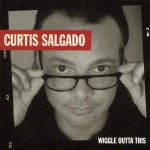 Curtis Salgado
Curtis Salgado
Wiggle Outta This
Shanachie Records
Curtis Salgado has been a fixture in the Northwest Blues scene since before time beganÑ or so it seems. His experiences in the music business are legend: from his early days in Eugene, playing with Robert Cray; introducing John Belushi to his personae: Jake of Blues Brothers fame; gigs with Roomful Of Blues and Santana; a lineage of recorded projects that have met with varying degrees of success over the years. Through it all, Salgado has proven his longevity while overcoming obstacles such as the fickle whims of the listening public, to endure as a mainstay in the Blues community.
Beyond that, Curtis is a true Blues buff and the consummate fan. When he covers a tune, he knows how the masters have treated it. His profound respect for the idiom and his own pride in what he has achieved, lend each song that he performs a distinct air of authenticity. After 25 years of walking the walk and talking the talk, Curtis Salgado has the Blues down cold.
Here, for what is apparently only his fourth album after all this time, Salgado spices the punch with a mix of original tunes and covers. In order to accomplish a more refined sound than that found in his previous recorded offerings, he enlisted the aid of Marlon McLain, another local legend, to act in the role of producer (he also plays guitar on one track).
In addition, other stars, such as bassist Nate Phillips and guitarists Terry Robb and Duke Robillard sit in on several tracks. But Salgado’s regular band supplies the heat on most of the ten cuts. Keyboardist Peter Boe co-wrote several of the songs with Curtis, including the title track. Guitarist John Wedemeyer, bassist Victor Little and drummer Reinhardt Melz provide a strong foundation upon which Salgado builds his presentations.
And they are, for the most part, first-rate presentations. Lyrically, as might be expected, given the genre, the originals don’t really mean very much. They lack the deep emotional appeal of Blues standards. This becomes readily apparent when Curtis swings into one of the three cover tunes on the album.
“Wiggle Outta This” is the obvious single. It fairly spits with restrained instrumental fury. Nate Phillips’ spot-on bass work drives the tune. His fat tones bounce propulsively beneath guest drummer Mark Lomax’s simple, solid beat. Wedemeyer contributes a jagged guitar twang at the turns of the verses.
Curtis’ vocal rips through the lyrics with animated gusto. It’s a story songÑ Curtis’ girl was born with a silver spoon in her mouth, she’s spoiled rotten. And now he’s about to confront her with the evidence: “I saw you on the corner with some other guy/Now you’re crawlin’ back to me, you got a tear in your eye.” The sum of all this sounds sort of like Kim Wilson of the Fabulous Thunderbirds fronting the Robert Cray band. A fine confection in which Salgado even trots out his trusty harp for a soulful solo.
Having gone on record as attempting “a pure sex song using John Lee Hooker as a model,” Curtis misses the mark lyrically, the imagery not quite congealingÑ “You make me rise like cookie dough.” Well… customarily, it’s bread dough that rises, yeast being the primary instigator in this instance. Yeast cookies might make a tasty desert along side a beer, but otherwise rising cookie dough seems like a stretch, so to speak. But instrumentally, the ensemble ably captures Hooker’s sense of pent-up voogum. Here again, Salgado unleashes a molten harp solo.
Robillard’s presence adds smoldering riffage to “Why I Don’t Care,” a sprightly Soul-infused number. Guest Louis Payne’s soaring organ fills and Little’s prodding bassline help to propel Melz’ lazy beat. Curtis’ smooth, controlled vocals and peerless harp solos make of this track a keeper.
Phillips and Lomax, joined by McClain on guitar, lend “Sing My Song” a decidedly different, more Gospel-like feel. Margaret and Mary Linn, longtime veteran backup singers, add rich harmonies to the background vocals. The song is a nice departure for Salgado. Despite an awkward hookline, “Sweet Jesus Buddha The Doctor” is a smooth piece of work, again with hints of Gospel worked into the production. Sweet harmony vocals and a sterling chromatic harp solo by Curtis help to sell this one.
The three covers are heartfelt renditions of songs made famous by Blues and R&B greats. Salgado’s take on Al “TNT” Braggs’ “That’s All A Part Of Loving You” touches all the bases. His explosive reading of Donald Bryant’s “I Want Everyone To Know” stands proudly next to the version patented by one of his idols, the legendary O.V. Wright. His treatment of J.B. Lenoir’s “I Feel So Good” is reverently faithful, and serves as the perfect vehicle for some very stylish harp excursions.
What stands out clearly on every tune is Salgado’s world class abilities as a singer and harmonica player. He can style his way through pedestrian material (which he does on a couple of occasions here) or light up like a rocket on a superior number (which he does several times on this outing).
Curtis could easily sing anything and sell it. He has a gift for that. But he also has, beyond a great vocal instrument, an ability to create his own distinctive technique, while displaying the sort of ubiquitous versatility that would allow him to sing Standards or Heavy Metal with equal ease. He has simply chosen the Blues and R&B. And at that he has succeeded. This isn’t a great album, but Curtis Salgado is a great singer.
 44 Long
44 Long
Inside The Horses Head
Sideburn Records
Brian Berg and his band of seasoned sidemen have been slamming down their sterling brand of musical Americana for a few years now, creating a certain buzz for themselves in the process. Berg constructs intelligent, acerbically analytical ditties that range from Country-flavored ballads to ballsy rockers, hearkening to the likes of Neil Young, Creedence Clearwater Revival, Brian Wilson, The Beatles, Marshall Crenshaw and Elvis Costello.
The band’s first album, Collect Them All, released late in 1997, garnered critical praise and major label sniffage. This sophmore effort is hewn from the same stock, exhibiting Berg’s characteristic penchant for natty wordplay and his cohorts’ knack for delivering tasteful accompaniment or musical punch depending upon what the arrangement calls for. The twelve songs and two fragments presented on this outing don’t really further the band’s sound so much as to cement it.
As with its predecessor, this album is rampant with reverent musical references to some of the hallowed gods who no doubt populated Berg’s personal pantheon during his formative years. Neil Young of the early ’70s is especially evident, where it was not so obvious on Collect Them All. But heavy doses of the Beatles, Beach Boys and Marshall Crenshaw are always near as well. Berg summons these melodic threads from the musical collective memory, to weave them anew into unique sonic tapestries.
The album begins with “Noelle,” a Beatlesque number, which sounds like a possible single, contains a winking lyrical reference to Neil Young’s “After The Gold Rush” from the album of the same name. Over a droning two note guitar riff, Berg intones: “I was walking past the drugstore/ when the moment passed me by/should have been where I was needed one more time/Through the waves of intuition/washed ashore without a note/past the zombies in the market you founds home.” The Crenshaw-like chorus sticks like an old syrup bottle, lodging itself permanently in the pantry cupboard of the mind.
Guitarist Andy Ricker’s lick on “Colonize Paradise” recalls that of John Fogarty on Creedence’s “Fortunate Son.” Berg vocalizes in the verses like Stevie Winwood in his phlegm-throated days with the Spencer Davis Group. In the catchy choruses, tight vocal harmonies call to mind the Dwight Twilley Band in its mid-’70s heyday. “Even You,” perhaps the strongest song of the set, is less referential than most of the others (although there is a wry reference to Robert Frost in the bridge). A strong vocal melody in the verses, with intervals a-leaping across the staff, makes for a very memorable piece.
“Think You Should” could easily be the work of Pete Townsend on an early solo departure from the Who; Berg’s boyish tenor hovering adolescently above the proceedings, where drummer Cory Burden and bassist Eric Furlong thump a jaunty backbeat. Sounding a lot like an outtake from the Beach Boys’ Smile period, the fragment “Everything Goes By” features thick harmony vocals in a familiar barbershop style.
Ricker’s intense fretwork, coupled with densely harmonized vocals, sound like George Harrison’s guitar riff on Cream’s “Badge” overlain upon a Dwight Twilley romp. The laid-back Country cornpone arrangement of “Up On Blocks” is the foundation for Berg’s interesting lyrical rumination: “It’s time I got myself back to old Turpentineville/With the smell of success/And all them Cadillac De Villes/Up on blocks.”
Neil Young was obviously the model for “Steeple Chase,” which falls, thematically, somewhere between “Ready For The Country” and “Time Fades Away.” “No Way” shares melodic similarities with “Happy Days Are Here Again,” while delineating a romance that seems just out of reach.
There’s no sophmore jinx with 44 Long. Their second album, while not breaking much new stylistic ground, finds the band to be better integrated and more energetic than in its previous incarnation. There are certainly several radio friendly tunes here, to be sure.
The Country numbers presented, while acting as buffers between the more accessible rockers, do little to further the band’s cause. Instead, the band would do well to focus on the more upbeat Rock material and to let the alt. country stuff fall by the wayside. Berg’s strength as a songwriter and the band’s musical fortŽ are those mid-tempo rockers, where one can detect a genuine spark among the members. That is the area in which they will make their mark.
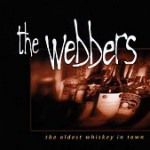 The Webbers
The Webbers
The Oldest Whiskey In Town
Self-Produced
Kal Tanner and the various individuals who have comprised the Webbers over the years are one of the best things to come out of Salem since the Decriminalization Bill of 1974. For over a decade, Kal and the boys have been churning out hard-bitten cowpunk: with the rebel spirit of Social Distortion, the careening drunken genius of the Replacements and the raw energy of the Blasters. The band shares a certain “open road” stylistic mentality with our own Thrillbilly, without sounding too similar musically. The two acts would make for a very good bill on any stage. Fans of one band would probably like the other as well.
Tanner and the current lineup of guitarist Phillip Washington, bassist George Kaylor and drummer Alec Burton (who first honed his chops as the drummer for the Confidentials in the early ’80s), cut a wide swath across Rock ‘n’ Roll terrainÑ from Rockabilly to Tex-Mex to Swamp Boogie; from Southern Rock to Texas roadhouse R&B. What the band lacks in subtle nuance is made up for in raucous high energy. But there are plenty of nuances here too.
“Drinkin’ Buddy” sounds like 38 Special doing a Gin Blossoms tune. A skittering guitar figure in the verses gives way to a more straight-ahead delivery in the vibrant choruses. Strong support harmonies also add flair. A Rockabilly sensibility drives “Flat Black, No Plates,” a gnarly low-string guitar riff roiling beneath Tanner’s hot asphalt lead vocals.
A solitary acoustic guitar is the sole accompaniment in the beginning of Washington’s “A Little Noise.” Soon enough, the song breaks out across a chiming power chord riff into a tough rocker. “Great Big Heart” is a two-fisted Swamp Rock manifesto, wherein Kal bald-facedly delineates his chief features. “Well I’m kinda lazy and I’m sorta fat/I don’t exercise, I don’t dig that/Drive a beat up Dodge, think it’s a Cadillac/I’m about as funny as a heart attack.”
“Maura Doesn’t Sleep On The Couch Anymore” is a nice change of pace, with a shimmering mandolin flickering in the mix. An interesting storyline and a sort of ’60s melody-line add to the charm. A Freddy Fender Tex-Mex feel decorates “One More Time.” Over latin flavored acoustic guitars and fluttering, bird-like mandolin trills, Kal croons a melody that bears a resemblance to the Country chestnut “Help Me Make It Through The Night.”
Two songs are mercilessly butt-ended in “Dirty Ass/Hey Buddy,” where twenty seconds of the two-step Cowpunk of the former segues into the Southern Boogie Buttrock of the latter. Kaylor’s “Bad Waitress” could easily pass for a Gin Blossoms tune (but not “Kim The Waitress”).
The nicest turn comes with “The Only One,” a big time love ballad of the first degree. Cello, piano and acoustic guitar are supported by gentle drums and bass as Tanner pours out his heart ‡lˆ Van Morrison with “Tupelo Honey.” But the piss and vinegar return on “Nothin’ Is My Favorite Thing To Do,” where Tanner points his flamethower voice toward the contained rocket fuel the band provides.
The Webbers distinguish themselves as a fine Rock band with a wide assortment of well-crafted songs- tales of liquor-riddled abandon and soulful redemption, supported with solid musicianship and fiery energy. The best lineup yet for veteran Kal Tanner and crew.
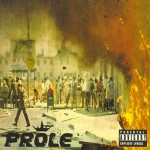 Prole
Prole
Prole
Self-Produced
Prole are a talented assemblage comprised of schizoid drums, sub-sonic bass, relentlessly rumbling twin guitars and venomously vehement lead vocals. If bile were traded on the Stock Exchange, these guys would be billionaires. How such sidewardly mobile young American dudes could be so desperately unhappy in a society so rich with abiding financial and emotional rewards is mystifying, to say the least. They must have had wretched childhoods to contemplate such desolately dissolute existences. However, their gear is state of the art.
Stylistically, the Prole boys mix a large helping of Korn; Tooled through Mercury Rev.; served to Rob Zombie on a shard of shattered windshield from Rage Against The Machine. Theirs is a mostly cheerless fury signifying je ne c’est quoi. But there it is. They execute their violent musical animadversions with snide, cyanide precision. If a dark world view and seething disapprobation are your cup of hemlock, then let Prole be the vile waitrons of your rotting soul. And… you can dance to them.
The album kicks off with the taut guitar intro to “Inside,” which detonates into a vicious rap, tougher, but reminiscent of the Red Hot Chili Peppers’ “Give It Away.” A nice intro effect of an old record being played through a child’s phonograph explodes into the verse of “Dope,” a tom-propelled gut rap with a threatening undertone. The big, bowelly guitars of Steve Smithson and Brandon Mikel emit dithering squeals and burbling squeaks, wrestling with Joe Colegrove’s sputtering bassline that: so low it is more a pulse than an actual tone. Over Noah Thorburn’s beefy Bruford-like drumsmanship, vocalist Tyler Roberts mulls his barely repressed rage. “Brake” is short and bitter. With “Murderer” the lads vent their misogynistic spleen.
Utilizing Rev-ish effects on “My2K?” the Prole guys offer a gloomy forecast of the coming apocalypse spurred by the ostensible crisis that will bring our computer dependent society to its knees at the stroke of midnight this coming New Years Eve. “I Know” is drum driven, with more conventional guitar tones. Not so dark- at least for a while. “Basket” is pure, molten, paranoid, anti-social fury. And “Fryday” a chainsaw, hockey mask slasher love song evolves into an uncharacteristic pastoral gambit before reverting to wrathful remonstrance.
Prole exhibit determined bad vibes with brutally visceral music that scores with a lot of hard body punches, though not many to the head. They match their more illustrious peers in intensity and fervor, if not in technical virtuosity and originality. Still, one longs for a display of some emotion other than unadulterated animal rage. On rare occasions Prole a expose more vulnerable side but rapidly subdue it beneath a veil of frenzied censure. There must be more to life than this. Man cannot live upon bile alone.
 Tami Greer
Tami Greer
T Greer
Burnside Distribution
It’s been a long, circuitous career for Ms. Greer, transplanted within the past year from Vancouver, BC. After picking up the guitar at the relatively late age of 24, as a means to cope with her mother’s death from cancer, Tami has spent the past fifteen years honing her musical and literary chops— culminating with an appearance last Summer in the Vancouver stop of Lilith Fair. What in the world would possess a woman nearing 40, the single-mother of a teenage daughter, to come to Portland to seek fame and fortune in, of all things, the music business? Well a lot of talent, for starters.
These are tunefully intelligent songs in the Vega/Crow/Colvin vein, exquisitely crafted by an artisan songwriter; expertly rendered by a superb line-up of BC sidemen, coupled with Greer’s fine vocal delivery: which combines Crow’s sassy sauciness with the wry deadpan of Vega and the homespun sweetness of Colvin.
Credit guitarist Luke Doucet with passionately original contributions on nearly every number, infusing each with a signature style and texture. Doucet and keyboardist David Kershaw have worked in the studio with Sarah McLachlan and they, as well as the other members of the supporting cast, lend a vibrant sheen to all of the songs.
Doucet outlines the parameters of “Full Moon Over Prague” with jagged, vibrato-laden strata of guitar, overlaid upon the fulsome foundation of bassist D. Lee and drummer V. Ditrich. Greer enters at the verse with a smoky sultriness Crow has mastered: busting into a lively chorus reminiscent of Holly Vincent from the New Wave days. “Captain love” benefits from some subtle interplay between Doucet and Lee and Greer’s biting lyrics. “Blast off Captain Love/Pulsar keeps steady time/Another dead star/Cast off Captain Love/Robbed of glorious shine/ You’ve learnt to eat your young.”
“I Got A Buzz” treads nearer to the poignancy of Colvin, with a sordid tale of drugs and disillusion in the City of Angels. Colvin comes to mind again on the beautiful “Stick Horse.” Acoustic guitars and hand percussion, augmented by Kershaw’s gorgeous Hammond accompaniment, achieve simple elegance behind the wistful, winsome tale that Tami tells.
Colin Cripp’s well-placed melodica and slide guitar fills add verve to “UFO,” as Greer weaves a parable comprised of mysterious verses and a memorable chorus. It’s a bluesy voodoo spell that fires “Gas Stove.” Over Doucet’s snaky guitar riffs, Tami creates a hot and bothered prairie mood akin to those purveyed by Cowboy Junkies or Paula Cole— bubbling over with a smoldering libido.
The centerpiece of the set is the viscerally wrenching “Down Deep,” an open wound of a song, that recounts in chilling detail the events surrounding long term physical abuse and the mounting sense of fear, dread and desperation that inhabits such a world. Doucet’s solitary acoustic guitar is joined by Vidrich’s slapping brushes on snare drum, as Tami delicately delineates a harrowing fable of thinly veiled menace and barely repressed violence. Violinist J. Zubot trades ethereal sonic embroideries with Kershaw’s “Strawberry Fields” (occasionally backwards) melotron interludes through the second verse, abetted by Doucet’s hard smacking electric guitar in the shudderingly incoherent chorus. An horrific gem.
“Lucky” moves closer to Vega territory, a tightly-woven character study of one of the denizens of the murky periphery, who linger at the very edges of perception— álà “Luka.” The smart snap of “The Ballet” utilizes Reggae upstroke guitar in the verses, dissolving into a dizzying dither in the bridges; while Greer explores the exploitation inherent in the industry of Classical Ballet. “Perfect Fingers,” the simplest song of the bunch, is a return to Greer’s Country roots.
Tami Greer confirms that she has come to Portland with a hard-won pedigree and an album that deserves far more attention and support than it has thus far received from the local community of critics. For, here is a songwriter of finely attuned skills and a singer of strong and subtle abilities, working with a sterling crew of musicians, dedicated to providing her with the finest palette from which to construct her musical visions. She deserves more than our mere attention. She deserves our respect and admiration for her achievement.
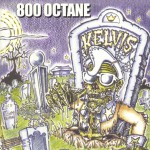 800 Octane
800 Octane
The Kelvis
We Got Records
Don’t let this album’s ghoulish cover art or punkish musical stance fool you for a second. This energetic power trio derives it’s heritage more from Pop bands such as the Ramones and Husker Dü than from Black Flag. Except for the non-pareil title track, these are songs about love and life, friends and family— with the occasional sci-fi potboiler thrown in for drama.
Their musical format is dedicatedly of the two-step goosestep variety; but the civility of their subject matter and the band’s wholesome attitude towards it, would lead one to determine that, despite their allusions to Satan in the liner notes: 800 Octane sound very much like a Christian Punk band. And a pretty good one at that.
The obvious comparisons are to Bad Religion or a way speeded-up Green Day. But 800 Octane aren’t even snotty about what they do, despite their relentless pursuit of a Punk sound: agitated, distorted guitars, bludgeoning bass and rapid-fire drumming. Insistent to say the least. But in reality the band does a disservice to some very catchy songs, whose full power could be better demonstrated with some variety in their arrangements.
Still, there is a lot of tuneful music here, delivered with all the subtlety of a machine gun rampage. The album kicks off with the title track, a savage onslaught, with lyric overtones of zombies and mayhemic blood lust. Ooooo scary kids! Soon enough the boys desert that motif for the more comfortable surroundings of “Condescend” which could easily be by (or about) Ric Ocasek of the Cars— except that the song is traveling in metronomic hyperspace.
The members of the band, have chosen anonymity (perhaps they are wanted by the law or owe on a big phone bill), other than lyricist Dave, who steps out from the shadows to take responsibility for his actions. One would guess that Dave is the singer of these words, and quite possibly the guitarist as well. That would leave the bassist and drummer as remaining entirely nameless, which, in the case of journalistic extrapolation, is limiting. The songs, however, do have names.
“Radio” is a sprightly number, with well defined verses and choruses, crammed into a minute and twenty seconds. Both it, and the succeeding number “Still The Same,” echo some of the driving melodicism of Billy Rancher and the Unreal Gods in their early years, with more of a Punk attitude, of course. “Pimp Ray” is a sci-fi send-up that seems to fuse “The Day The Earth Stood Still” with “Superfly.” Very strange indeed.
The singer, evidently our friend Dave, has a distinctive vocal style, that calls to mind Danny Elfman’s early stints with Oingo Boingo, nicely illustrated on “Shaken” a tune where the band breaks into a sort of accelerated surf beat, while displaying an actual propensity for a comparative sense of dynamics. Bravo lads! “The Amazing Criswell” has some interesting historical information that seems formulated from the collective unconsciousness of the Ed Wood Fan Club.
“Alien” succeeds where “Criswell” fails with some exciting ensemble work, charging hard across a molten musical landscape. “On My Side” is a hit song, with strong hooks abounding, as scorching guitars clear a wide path for the artillery of the rhythm section. “Brand New Faces,” thematically closely aligned with John Lennon’s “In My Life,” changes directions with a tom-driven jungle beat intro and a memorable chorus.
Coming in with thirteen songs in just over a half an hour, 800 Octane do not waste time or effort on the superfluous. They get to the point and get off, usually in about two and a half minutes. While this would seem to correspond with their current musical pretensions, the vengeance of their presentation does not always seem befitting of the possibilities their songs exhibit. Given more variety in the arrangements of these well-written songs, with a more loving understanding of what they are meant to say, this band could reach a much wider segment of the listening public, and achieve the potential they consistently display here.
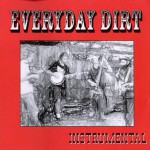 Everyday Dirt
Everyday Dirt
Instrumental
Siren Music
Members of Calobo, Caleb Klauder on mandolin and Nate Query on upright bass, join forces with fiddle/banjo/guitar man Alan Glickenhaus, of Higher Ground and Blue Honey, and guitarist Al Mekel for a jaunty set of Bluegrass and Oldtime Swing tunes— divided equally between original pieces, and cover material comprised of traditional nuggets as well as renditions of standards from the likes of George Gershwin, Bill Monroe and Django Reinhardt and Stephane Grapelli. Varied fare to be sure, but delightfully rendered by this versatile quartet of craftsmen, captured from these well-recorded live performances.
The album’s title is the theme here, as the group navigate expertly through the sixteen tracks, as might be expected of these seasoned veterans. Each cut contains joyous moments of spectacular interplay between the various members, utilizing a wide array of instrumental textures to create unique aural settings for each piece.
The Bluegrass breakdown “Dear Old Dixie” affords the guys the opportunity to step up for a series of solos, showcasing their talents; serving as a musical introduction to the band. Glickenhaus stands out with sterling banjo licks. Glickenhaus emulates Grapelli on fiddle while Klauder interprets on mandolin Reinhardt’s characteristic style on the gypsy swing of “Minor Chord.” The mournful Monroe tune, “Misty Moonlight Waltz” breaks into a dapper stride in the turnarounds as Klauder and Glickenhaus harmonize with mandolin and banjo.
Maintaining a Western feel, Glickenhaus’ fiddle tune “Mar Pacifico” kicks up a little dust of it’s own, evoking the scents of sage and creosote. Glickenhaus wisely steers his fiddle through a soulful solo before launching into the familiar strain’s of Gershwin’s “Summertime.” Mekel and Query (which sounds like a law reference of some sort) lend this version a decided Van Morrison, “Moondance” feel, pushing the changes a little harder than most versions. Klauder counters with a chiming solo of his own near the end.
Klauder and Glickenhaus duel in a precise duet of mandolin and fiddle on the exhilarating Django gem “Swing 42,” dancing sweetly across the basic riff, while trading exemplary solos. The band’s treatment of the Celtic-colored “Over The Waterfall/Rachel- St. Anne’s Reel” is irrepressible as Klauder and Glickenhaus unite for another rousing grapple between mandolin and fiddle.
Mekel’s bluesy “Parallel Blue” serves as a stylistic fulcrum between the fiddle dominated front end of the album and the more divergent aspects of the back half. Glickenhaus, playing guitar on this excursion exchanges tasty solos with Klauder’s mandolin. Klauder’s dizzy “E. M. Dryer” cascades like raindrops with Glickenhaus’ banjo falling in tandem with the mandolin. Glickenhaus’ title track, a pretty banjo tune interjects a strange Drifters-ish R&B structure into the mix.
Acoustic folk fans will find a full plate of meaty chops and salty licks with a heaping helping Everyday Dirt at their musical banquet table. The boys find inventive ways to combine their various instruments, taking a detour whenever the scenery starts looking too familiar, yet all the while maintaining the direct lineage of their mentor heroes. A real fine album.
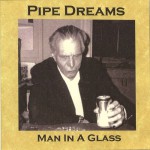 Pipe Dreams
Pipe Dreams
Man In A Glass
Dreamworx Music
The initial faint promise of the layered-synth ambient instrumental “A Nightmare” soon gives way to overblown Metalized guitar machinations of the three songs that follow. Pipe Dreams, the duo of bassist Rick Dudley and songwriter/drummer/keyboardist/guitarist/vocalist Bryce Van Patten, tread within an anachronistically dark musical labyrinth, affecting the operatic sturm und drang grandiosity of long-departed Gods such as Uriah Heap or really early Black Sabbath.
All three songs: the barracuda title track, the similar “Climb The Ladder” and the similar “Dog Turds” elicit a certain White Zombie edge to the proceedings, but lack an apparent sense of humor, so elemental in Rob Zombie’s personae. The musicianship here is not the problem. Van Patten is a solid drummer and a pretty fair guitarist, if only adequate as a Metalgawd vocalist. Dudley is a journeyman foil.
The problem lies in the fact that all this sort of stuff has been bludgeon to death over the decades. And unless you have an interesting new use for an expired equine— you might dress it up as an exotic lawn ornament or try to make a ride out of it for the kids: but either way, you’re pretty much stuck with a dead horse. And what’s the sense of beating it with the a screaming, heavily amplified guitar?
Van Patten demonstrates the raw skills on guitar, drums and keyboards necessary to fashion something different from this creature; a silk purse perhaps. But such a transformation would require a resolute commitment on his part to seek some singular spark of invention, in order to transmute into a golden statue that poor dead horse.
